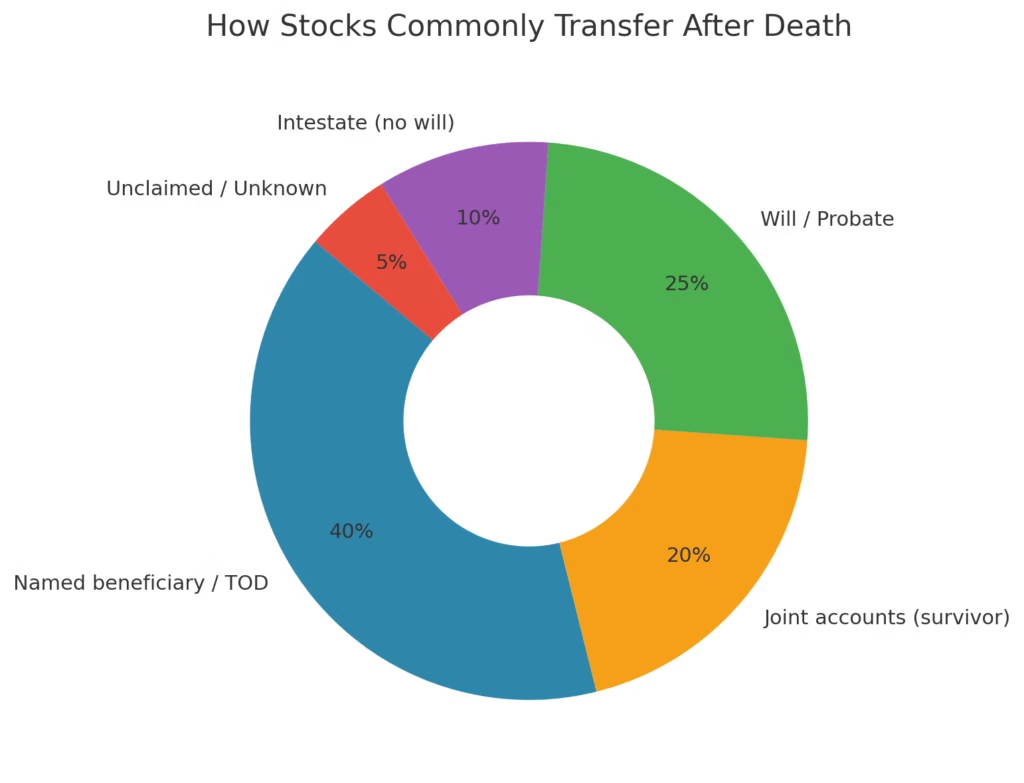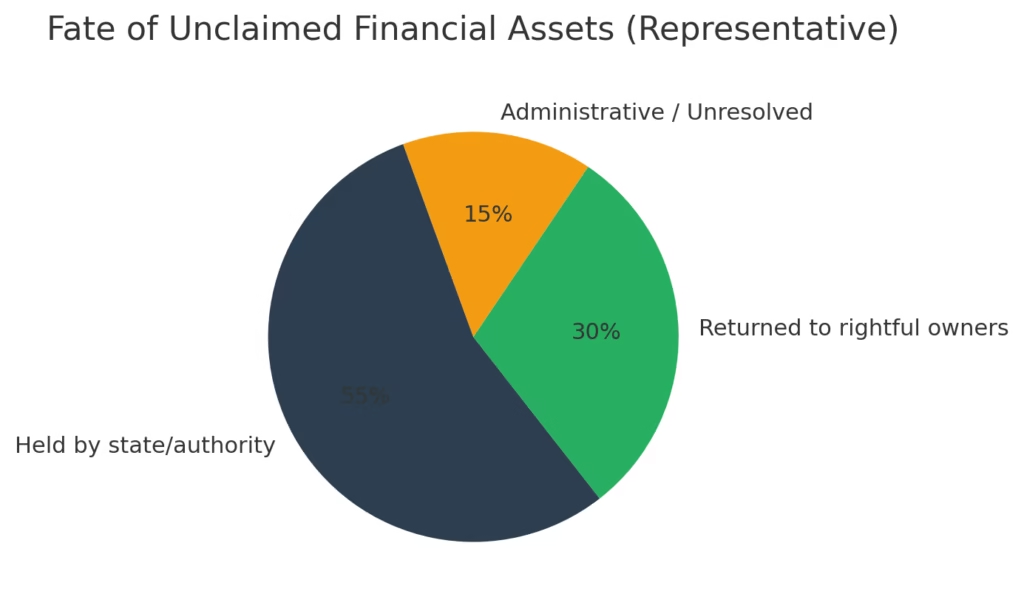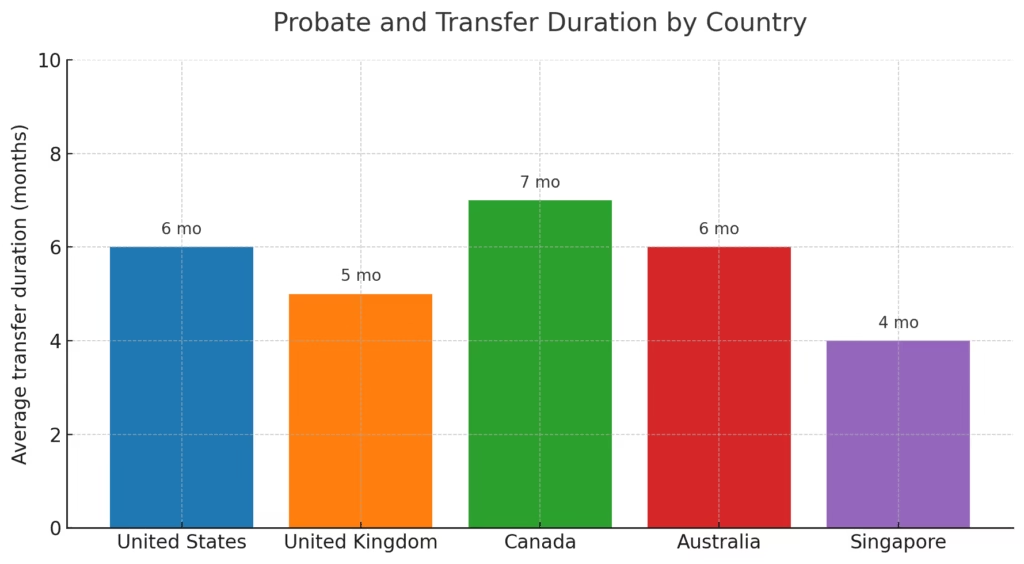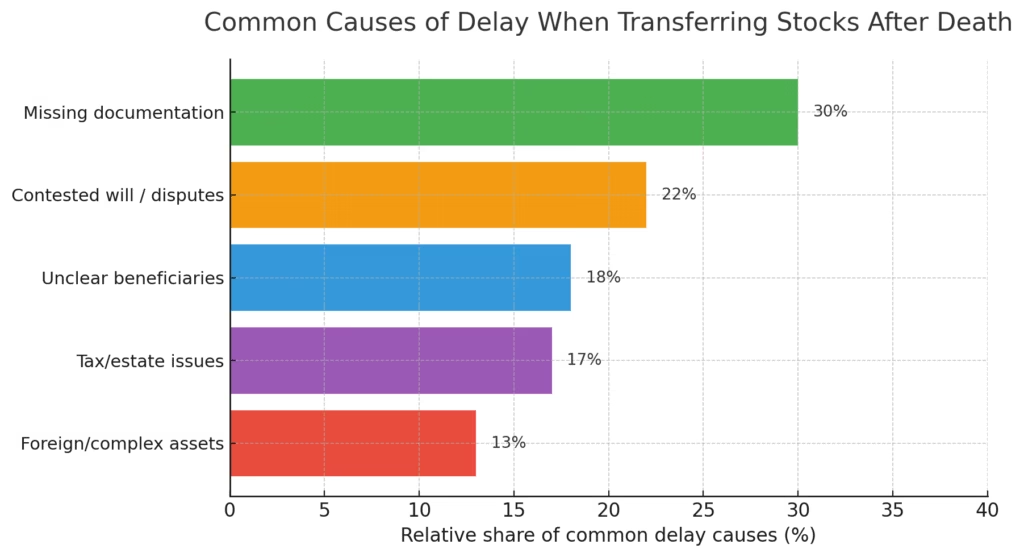
Have you ever wondered what happens to your stocks after death if no one knows your portfolio exists? It is a question many investors avoid, yet it is one of the most crucial aspects of financial planning. The truth is, most people spend years buying shares, mutual funds, or ETFs but rarely plan what will happen to these assets if they are gone tomorrow.
This guide will help you understand what happens to stocks after death, how stocks transfer after death, and what to do if there is no life insurance or will in place. Whether you live in the US, UK, Canada, Singapore, or Australia, this guide will show you the right way to protect your family and investments from being lost forever.
Understanding What Happens to Stocks After Death
When someone passes away, all their financial assets including bank accounts, real estate, and stocks become part of their estate. The ownership of these assets does not automatically vanish. Instead, they are handled through a legal process called probate.
Probate is a court-supervised process that determines how a deceased person’s assets are distributed. The process ensures debts, taxes, and legal obligations are settled before transferring ownership of the remaining assets to heirs or beneficiaries.
In simple terms, if you own shares of Apple, Tesla, or Amazon, those shares do not just disappear. They remain in your investment account until a legal heir claims them either through a will, insurance, or the probate process.

Scenario 1: You Die With a Will or Beneficiary Designation
If you already have a will or have designated a beneficiary in your brokerage account, things are fairly straightforward. The broker or transfer agent will require the death certificate and the beneficiary details to transfer ownership.
For instance, if you had a Fidelity or Charles Schwab account and had listed your spouse or child as the Transfer on Death (TOD) beneficiary, your stocks can be transferred directly without going through probate.
This process is smooth because you have made the legal arrangements while alive. The brokerage firm will handle the transfer once documentation is verified.
Scenario 2: You Die Without a Will or Life Insurance
This is where most problems begin. If there is no will, insurance, or TOD beneficiary, the estate enters intestate succession, meaning the state decides who gets your assets based on the inheritance laws in your country.
Here is how it generally works:
In the US, the laws vary by state, but typically, your spouse and children share the inheritance. If you are single and have no children, it may go to your parents or siblings.
In the UK, the Intestacy Rules apply, giving priority to your spouse and then your children.
In Canada, provincial laws decide, but the order is usually spouse, children, parents, then siblings.
In Australia and Singapore, succession laws operate similarly, distributing assets to the closest living relatives.
However, without clear documentation or proof of ownership, your shares might remain unclaimed or locked indefinitely in brokerage accounts.
What Happens to Unclaimed Stocks
Believe it or not, billions of dollars worth of unclaimed shares sit with governments and financial institutions worldwide.
For example, in the US, unclaimed assets eventually go to state unclaimed property divisions. Each state maintains a database where family members can search for unclaimed stocks or funds.
Visit the National Association of Unclaimed Property Administrators (NAUPA) website to search for lost or forgotten investments.
Similarly, the UK’s Unclaimed Assets Register and Canada’s Unclaimed Balances Database perform the same function. Always check these portals if a deceased relative was an active investor.

Why Life Insurance Plays a Key Role in Stock Inheritance
Life insurance is not only about replacing income. It can also act as a financial bridge for families waiting for the probate or asset transfer process to complete.
When a person dies, brokerage accounts can be frozen until the estate is legally settled. This could take months or even years. During this period, the family might face financial strain.
A life insurance payout helps in:
Covering legal and probate expenses
Paying taxes on capital gains or estate transfer
Maintaining family expenses until inheritance is released
So even if your goal is long-term stock investing, pairing your portfolio with life insurance ensures your dependents do not have to sell investments prematurely or lose access to them.
How to Transfer Stocks After Death
If you are handling someone’s estate, here is a practical step-by-step guide on how to transfer stocks after death.
1. Obtain the Death Certificate
You need an official death certificate before initiating any financial transfers.
2. Contact the Brokerage or Financial Institution
Reach out to the broker such as Fidelity, Vanguard, Schwab, TD Ameritrade, or the share registrar if it is a direct stock holding.
3. Provide Proof of Authority
If you are the executor or administrator, you must show legal documents proving your right to manage the deceased’s estate.
4. Submit Ownership Transfer Forms
Most brokers provide Transfer of Ownership or Transfer on Death forms. Fill these carefully with supporting documents.
5. Pay Applicable Taxes and Fees
In some jurisdictions, inheritance or estate tax may apply before the transfer can be finalized.
6. Receive Confirmation
Once approved, the new shares will appear in the beneficiary’s brokerage account.
Common Mistakes People Make
- Not Naming Beneficiaries: Most investors skip adding TOD designations, leaving families stuck in probate.
- Ignoring Digital Records: If login details are not shared or documented, heirs may never access the account.
- Avoiding Legal Help: DIY transfers often get delayed due to missing documents or incorrect forms.
- No Backup Plan: Without life insurance, heirs may face liquidity issues even if the portfolio is large.
Real-Life Example: The Forgotten Portfolio
Consider this. A 65-year-old man from Texas passed away leaving behind 180,000 dollars worth of stocks in his E*TRADE account. He had no will, and his family did not even know the account existed. It took two years of legal procedures before the assets were released. During that time, the portfolio value dropped by nearly 25 percent due to market volatility.
Had he designated a beneficiary or insured backup, the transfer would have been immediate and tax-efficient.
Curious question for you:
If something happened to you tomorrow, would your family know how to access your brokerage account?
Share your thoughts in the comments. This discussion could save someone’s future wealth.
If you are planning your retirement, check out our guide on How Much to Save for Retirement in the USA.
Legal and Tax Aspects of Stock Inheritance
Now that you understand the basic process of what happens to stocks after death, it is time to go deeper into how taxes, legal procedures, and inheritance laws work across major countries like the US, UK, Canada, Singapore, and Australia. This will help you make sense of how to transfer stocks after death smoothly and avoid unnecessary financial or legal stress for your family.
1. The Legal Process of Stocks Transfer After Death
When someone passes away, their stocks become part of the estate and are managed according to the country’s inheritance or probate laws. The goal of this process is to confirm ownership, pay applicable taxes, and ensure that the rightful heirs receive what is due.
United States
In the US, if the investor had named a Transfer on Death (TOD) beneficiary, the process is quick. The brokerage firm transfers the stocks directly to the beneficiary once the death certificate and ID are verified.
If there was no TOD designation, the estate goes through probate. The executor will submit an inventory of all assets, including the investment accounts. Once debts and taxes are cleared, the remaining shares are distributed according to the will or state intestacy laws.
United Kingdom
In the UK, stocks are included in the estate and managed under inheritance law. If there is a will, the executor handles the distribution. Without one, the court appoints an administrator. The process may take several months depending on the value of assets and outstanding taxes.
Heirs must apply for a “Grant of Probate” (if there is a will) or “Letters of Administration” (if there is none) before brokers release the assets.
Canada
Canadian law requires the executor to file a final tax return and pay any capital gains on the stocks before distribution. For example, if the deceased bought stocks for 10,000 dollars and they are now worth 25,000 dollars, the unrealized gain of 15,000 dollars is considered “deemed disposition” and taxed.
Only after clearing taxes can the estate transfer ownership of the stocks to the beneficiary.
Singapore
In Singapore, most assets including stocks go through the Grant of Probate or Letters of Administration process. However, certain accounts allow nomination, similar to TOD in the US. If the investor made such nominations, transfer is immediate.
If not, legal representatives must work with the Central Depository (CDP) or relevant financial institution to release the shares.
Australia
Australia’s probate process depends on the state or territory. If the shares were held with a broker under CHESS (Clearing House Electronic Subregister System), they can be transferred using a Transmission Application Form. Taxes on capital gains may apply depending on how the estate is structured.

2. Taxation on Inherited Stocks
A key concern for beneficiaries is whether they will have to pay taxes when inheriting stocks. The answer depends on where you live.
United States
In the US, there is no inheritance tax at the federal level, but some states such as Iowa, Maryland, and Nebraska impose inheritance taxes. The most important rule here is the “step-up in cost basis.”
When you inherit stocks, their cost basis is reset to the market value on the date of the owner’s death. This means if your parent bought Apple shares for 50 dollars and they are worth 150 dollars on the day of death, you inherit them at 150 dollars.
If you later sell them for 160 dollars, you only pay capital gains tax on the 10-dollar increase, not the entire 100-dollar profit. This rule helps heirs reduce tax burdens significantly.
United Kingdom
In the UK, there is Inheritance Tax (IHT) on the estate’s total value if it exceeds the threshold (currently £325,000 as of 2025). The standard rate is 40 percent, though there are exemptions and allowances for spouses and charitable gifts.
Beneficiaries do not pay capital gains tax immediately but will owe it later if they sell the inherited shares at a profit.
Canada
Canada does not have inheritance tax, but it applies capital gains tax on deemed disposition. The estate must report the fair market value of investments on the date of death, and the difference between the purchase price and that value is taxed as a capital gain.
This can create a big tax bill for estates with significant stock portfolios. Planning with a financial advisor or tax professional can reduce the impact.
Singapore
Singapore abolished estate duty in 2008. This means there is no inheritance tax. However, if the deceased held foreign investments in countries that still impose estate or inheritance taxes, those rules may still apply.
Australia
Australia does not impose inheritance tax, but capital gains tax may apply when the beneficiary eventually sells the inherited stocks. The cost base is adjusted based on the deceased’s acquisition cost, not the market value at death. That means long-term holding may be more tax efficient.
3. How to Avoid Legal Delays in Stock Transfer
Delays in the stock transfer process are extremely common, especially when families do not know where investments are held. Here is how to ensure your heirs can access your portfolio easily and legally.
Create a Will or Estate Plan
List all your financial assets including brokerage accounts and digital wallets. Make sure your executor knows how to access these details.
Add a Transfer on Death (TOD) Beneficiary
Most major brokers like Fidelity, Schwab, and Vanguard offer a TOD option. It allows your chosen person to inherit your assets directly without court involvement.
Maintain Updated Records
Keep all investment documents and digital logins secure but accessible. Use a password manager or digital vault service for this purpose.
Use Joint Accounts
In some regions, joint accounts with rights of survivorship automatically pass to the surviving holder without probate.
Work With a Financial Planner
A professional can help you minimize taxes and structure your portfolio so it passes to heirs seamlessly.

4. Example: The Step-Up Rule in Action
Let’s say Emma bought 200 shares of Microsoft at 100 dollars each. When she passed away, the shares were worth 300 dollars each.
Her son James inherits them at 300 dollars per share. If he sells later at 320 dollars, he pays capital gains on 20 dollars per share, not the full 220-dollar increase.
This rule helps preserve family wealth and encourages long-term investing rather than forced liquidation.
5. What If No One Claims the Stocks?
If no family member claims the stocks, they eventually become unclaimed property. Governments hold these assets indefinitely until claimed by rightful heirs.
For example:
In the US, visit missingmoney.com or unclaimed.org to search for unclaimed investments.
In the UK, use the government’s Unclaimed Assets Register.
In Canada, check the Bank of Canada’s Unclaimed Balances service.
In Australia, the Australian Securities and Investments Commission (ASIC) maintains a public database.
In Singapore, the Ministry of Finance keeps records of unclaimed funds under the Accountant-General’s Department.
It is always worth checking these databases if a relative was known to invest.
6. Common Myths About Stocks and Death
Myth 1: Stocks automatically go to the oldest child.
Fact: Inheritance laws define the order of succession, not family hierarchy.
Myth 2: The broker will inform your family.
Fact: Brokers are not required to track or inform families unless someone reports the death.
Myth 3: Stocks are lost forever if not claimed.
Fact: They are held by the government until claimed, though dividends may stop accruing.
question for you:
If you inherited stocks tomorrow, would you know how to transfer or sell them?
Share your thoughts in the comments below. Real-life stories help other readers learn from practical experiences.
You can also check the official resources like the Smart Asset’s Inherited Stocks Guide for detailed information on how inheritance works across brokers and states.
Protecting Your Stocks and Family’s Future
If you’re reading this, ask yourself: what would happen to your stocks if something unexpected occurred tomorrow?
Here are simple ways to protect your portfolio:
- Add a Nominee or Beneficiary
This ensures your shares directly transfer without court intervention. - Maintain a Clear Record
Keep a list of your investments, account details, and nominee names in a secure location. - Draft a Will
Even a simple digital Will can prevent years of legal disputes. - Consider a Trust
For high-value portfolios, setting up a trust helps manage distribution efficiently and privately. - Update Beneficiaries Regularly
Review them every 2 to 3 years, especially after marriage, divorce, or childbirth. - Use Life Insurance as a Safety Net
While this article focuses on stock transfer without insurance, having one ensures liquidity for taxes, legal fees, and dependent support.
Are You Prepared for Stock Transfer?
Answer these quickly:
- Do your family members know where your stocks are held?
- Have you named a beneficiary on all investment accounts?
- Is your Will updated in the past two years?
- Do you have a financial executor who understands your portfolio?
If you answered “No” to even one, it’s time to organize your financial life before it’s too late.
Common Frequently Asked Questions
What happens to my stocks after death if my nominee also dies before me?
The stocks will be distributed according to your Will. If you don’t have one, the law decides the next legal heir.
Can I transfer stocks to someone outside my family after death?
Yes, if clearly mentioned in your Will or beneficiary form.
Is joint stock ownership better than naming a nominee?
Joint ownership provides immediate transfer to the surviving holder, but it doesn’t replace a Will. Ideally, do both.
Final Thoughts
Understanding what happens to stocks after death is not just a legal necessity but a financial responsibility. Many investors plan their portfolios for decades yet overlook the final step of succession. Without proper documentation, years of investment can be locked in probate courts or lost due to unclaimed accounts.
Whether you live in the US, UK, Canada, Singapore, or Australia, take time today to secure your portfolio’s legacy. Review your beneficiaries, draft a simple Will, and consider professional advice. Your investments deserve continuity, not confusion.



